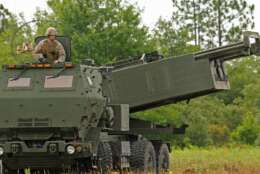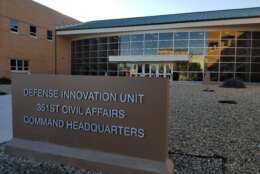Defense
-
If it's true that software is eating the world, that's certainly true of the U.S. military. One way to get crucial software is to develop it with your own people.
April 10, 2023 -
The Space Development Agency found ways to condense the timeline for its low earth orbit satellites.
April 07, 2023 -
Several federal agencies track, and try to do something about, the cybersecurity threat. Among them, the Department of Defense Cyber Crime Center, known as DC3.
April 07, 2023 -
One thing the nation has learned in helping Ukraine fight Russia, is how fragile our defense industrial supply base really is. From javelin missiles to major platforms, in a conflict the U.S. would run out…
April 07, 2023 -
Debate emerges over who should rebuild reduced Army stocks, federal employees or contractors.
April 06, 2023 -
The past three administrations have named China as the U.S. top rival, threat. Military leaders model what would happen in a conflict in and around Taiwan.
April 06, 2023 -
The Navy famously has a challenge in keeping its ships, ship shape and ready. Bolted to naval ships are the weapons systems that form a ship's purpose.
April 05, 2023 -
The Pentagon changed the leadership structure of the Defense Innovation Unit as a new director takes over.
April 05, 2023 -
The Navy's expansion of unmanned systems follows experimentation work it's been conducting in the Middle East, where it's combined drones with sensors connected together in a resilient mesh network.
April 05, 2023 -
Human migration patters, the billowing drug trade, allies nervous about China, it's all picked up the pace for the U.S. Coast Guard.
April 04, 2023 -
Pilot training outside of the cockpit, in a simulator, is known as synthetic training. It's getting more sophisticated and realistic.
April 04, 2023 -
DoD hasn't yet weighed in with an official position on whether a notional "cyber force" should become a new seventh branch of the armed services, despite years of Congress asking.
April 03, 2023 -
The Defense Department wants to expand its budget for mental health care, and the services are starting new programs to prevent harmful behavior.
March 31, 2023 -
Army leaders expect soldiers in 2040 to have greater technical abilities than their predecessors, and that will involve different training methods.
March 30, 2023 -
MHS Genesis, DoD’s new EHR, is now live at 75% of DoD’s clinics and hospitals, with 160,000 users and 6.1 million beneficiaries in the system. But officials believe its future benefits extend far beyond replacement of legacy systems
March 30, 2023
















